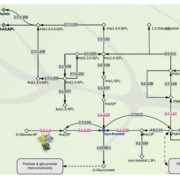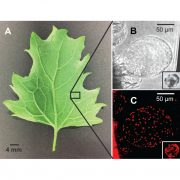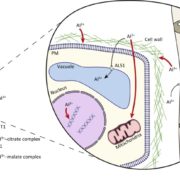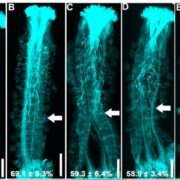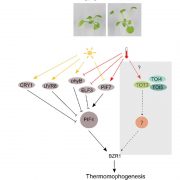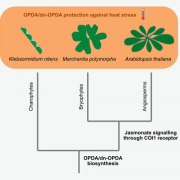A key role for flavanols in the promotion of pollen success (PNAS) ($)
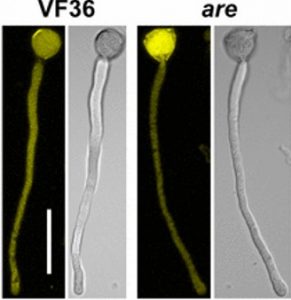 The reproductive success of angiosperms relies on the fertilization of the female gametophyte (egg sac) by pollen that travels long-distances in the pistil. Previous studies suggest a role for phenylpropanoid-related metabolites (flavonoids and anthocyanins) in controlling pollen growth and fertilization, however a mechanistic understanding of their function during this critical developmental process remains unknown. In a recent study published in PNAS (2018), Muhlemann et al. demonstrate the protective capacity of flavonols on pollen tube functionality under normal and heat-stressed conditions. Using a tomato mutant defective in anthocyanin accumulation, anthocyanin reduced (are), the authors outline an important role for flavonols in pollen grain accumulation, viability, germination, and tube growth within the pistil. Histochemical stains revealed the interplay between flavonol and reactive oxygen species (ROS) accumulation in pollen tubes, such that reduced flavonol levels in are mutants were associated with increased levels of ROS. This suggested that the complement of pollen grain/tube flavonols are required to scavenge/mitigate the impact of ROS, an idea that was supported by the rescue of are pollen defects by anti-oxidative ROS scavenging chemicals. The inhibitory action of ROS on pollen functionality was exacerbated in plants experiencing heat stress, where stress-related ROS accumulation negatively impacted are mutants to a greater extent than wild-type controls. Collectively, this work identifies flavonols as key regulators of reproductive success that act to limit the negative impact of ROS accumulation in pollen tubes. (Summary by Phil Carella) Proc. Natl. Acad. Sci. USA
The reproductive success of angiosperms relies on the fertilization of the female gametophyte (egg sac) by pollen that travels long-distances in the pistil. Previous studies suggest a role for phenylpropanoid-related metabolites (flavonoids and anthocyanins) in controlling pollen growth and fertilization, however a mechanistic understanding of their function during this critical developmental process remains unknown. In a recent study published in PNAS (2018), Muhlemann et al. demonstrate the protective capacity of flavonols on pollen tube functionality under normal and heat-stressed conditions. Using a tomato mutant defective in anthocyanin accumulation, anthocyanin reduced (are), the authors outline an important role for flavonols in pollen grain accumulation, viability, germination, and tube growth within the pistil. Histochemical stains revealed the interplay between flavonol and reactive oxygen species (ROS) accumulation in pollen tubes, such that reduced flavonol levels in are mutants were associated with increased levels of ROS. This suggested that the complement of pollen grain/tube flavonols are required to scavenge/mitigate the impact of ROS, an idea that was supported by the rescue of are pollen defects by anti-oxidative ROS scavenging chemicals. The inhibitory action of ROS on pollen functionality was exacerbated in plants experiencing heat stress, where stress-related ROS accumulation negatively impacted are mutants to a greater extent than wild-type controls. Collectively, this work identifies flavonols as key regulators of reproductive success that act to limit the negative impact of ROS accumulation in pollen tubes. (Summary by Phil Carella) Proc. Natl. Acad. Sci. USA


